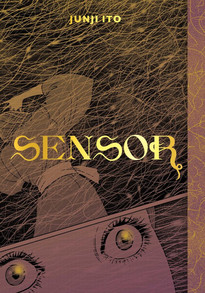Review
by Lynzee Loveridge,Sensor
| Synopsis: |  |
||
Mysteriously called to Mount Sengoku, Kyoko Byakuya witnesses a strange phenomenon: silk-like golden hairs rain down from the sky around the mountain. The inhabitants of a nearby village refer to the hair as "amagami" and believe it to be a divine blessing bestowed to them by a Christian missionary who was executed within the volcano. Further, they believe Kyoko was sent by God and that the mysterious fibers grant them psychic-enhanced powers. What Kyoko doesn't know is that her entry into the village will spur her own transformation and bring about a cosmic-level confrontation. |
|||
| Review: | |||
Sensor is easily one of the strangest Junji Ito yarns to date, combining Christian mythos, Lovecraftian beings, and a Heaven's Gate-style cult. It also flounders in its overall narrative purpose, something Junji Ito acknowledges in the volume's afterword. It revisits some of the themes previously touched on in Remina, but besides a few key moments, it lacks both punch and introspection on its general implications. The manga's plot is totally bonkers, but in the way that is standard Ito horror. It's amusing in what feels like reasonable expectations for suspending disbelief. I can come to grips with a volcano that emits golden filament that heightens psychic abilities after a Christian missionary and his followers are Spartan-kicked into its mouth. I can also accept a mass psychic event awakening a cosmic god from the depths of the universe. Where the book lost me is the introduction of its female stalker. Part of Sensor's narrative problems is its own indecisiveness. Initially, the story sets out to follow Kyoko Byakuya, a woman who stumbles upon the village that deifies Mount Sengoku and is covered in the psychic filaments that the volcano rains down on it. By the end of the first chapter, Kyoko has transcended to a magical-like psychic being and leaves the mountain. The story then switches perspective to follow a reporter who begins investigating her and the mountain in general. These first few chapters make up the original "travelogue" idea Ito was attempting to tell, with a reporter following Kyoko around as she becomes involved in various strange incidents. However, this tack is abandoned almost as quickly as it started. We get one "travel" chapter dealing with suicide that is effectively gross but not quite thought out enough to feel like it's trying to say something larger about it. There are hints that it is about how suicide can haunt loved ones, but also off-putting suggestions of guilt on the part of survivors and a compulsion for death by victims. Ito's work often treats suicide with high dramatics and rarely, if ever, with any kind of real emotional gravitas. Once the suicide bug (did I mention they were bugs?) chapter ends, we get to the stalker subplot and that's where things start to fall apart. The reporter is the victim of stalking and has done as much as he legally can to keep his stalker at bay. She becomes involved with the cult who seeks to utilize Kyoko's psychic powers to gain full knowledge of all space-time. Part of the cult's plot involves traffic mirrors: those rounded mirrors installed at intersections to help motorists see around corners. Basically, the cult orchestrates a plot to tilt a bunch of these mirrors and implant them with their own dark hair fibers to use like fiberoptic material and be able to see everything psychically. The story only spans a single chapter but the concept is just...dull and ridiculous. This is on top of the volcano Christianity psychics premise described above. Sensor is just weird. The few standout moments are when the story finds its legs and leans into its title. Kyoko's enhanced psychic abilities affect all of her senses in a way that is catastrophically overwhelming. Those who attempt to connect with her experience similar sensations and are represented in a physically grotesque way. A little more focus on that—the cacophony of sound, smell, touch, etc—may have made for a more cohesive horror story alongside the cosmic horror angle instead of the mishmash (that also eventually includes time travel) seen here. I also would have welcomed something more firmly rooted in the martyrdom of Christian missionaries in Japan. Christians were killed in droves for almost a century, including by crucifixion. The penultimate chapter includes an extended retelling of the Passion of Christ, albeit with a volcano instead of Golgotha, but it carries little emotional weight. Sensor is easily the strangest Junji Ito story I've read to date and there are certainly many ideas in it that are worth exploring. Unfortunately the book struggles to find what it wanted to do leading to a half-baked series of chapters that fail to scare. |
| Grade: | |||
|
Overall : C+
Story : C
Art : B
+ The connection to Japanese history is interesting |
|||
| Production Info: | ||
|
Full encyclopedia details about |
||